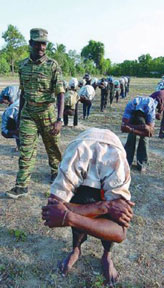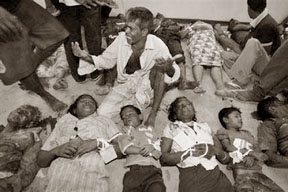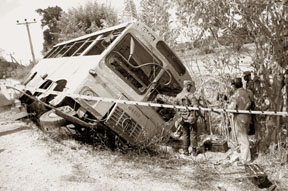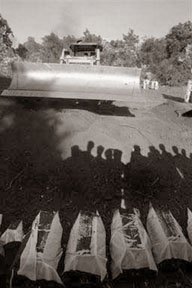|
observer |
|
|
|
|
|
OTHER LINKS |

|

|

|
'Engagement is the key' - Dr. Palitha Kohona
In this interview Dr. Kohona speaks about the gravity of the Sri Lanka's North-East crisis and the government's approaches to solve the problem. Question: With no end in sight to mindless violence, how do you assess the current situation? Answer: It is difficult to understand the approach of the LTTE [Liberation Tigers of Tamil Eelam] given the fact that the whole world has unequivocally expressed abhorrence of terrorism as a means of realising political goals. The LTTE continues to rely on terrorism. The U.N. [United Nations] has adopted 13 conventions against terrorism and the Secretary - General, as recently as two weeks ago, issued a report totally condemning the use of terrorism for political purposes. In the circumstances, total reliance on terrorism by the LTTE is totally incomprehensible. On the part of the government, it remains committed to resolution of the conflict in the country through negotiations. Our objective is to achieve a negotiated settlement that is just and equitable for all our people.
Q: What is your view on the LTTE's demand for exclusion of the European Union (E.U.) monitors from the Sri Lanka Monitoring Mission (SLMM)? A: I really don't understand it. The E.U. monitors from the Scandinavian countries are there in their individual capacity and not as representatives of their respective countries. The agreement relating to the monitors is between Norway and Sri Lanka. The recruits, though from the Scandinavian countries, are under Norwegian authority. The UNICEF [United Nations Children's Fund] consists of 191 member-states of the U.N. The Americans have banned the LTTE for a number of years now. Does it mean that the head of UNICEF in Sri Lanka, who is an American, is unacceptable to the LTTE? This will not punish the UNICEF. It will actually be a punishment on the LTTE itself because UNICEF does considerable good work in the areas controlled by the LTTE. So you think it is more of an excuse to stall talks. We feel that this is an excuse for not participating in the talks. Earlier in June, the Norwegians invited the government and the LTTE to Oslo for talks on the role of the SLMM. The Sri Lankan government accepted this offer unconditionally and it was made clear that I would be the head of the government delegation. The LTTE knew this and went to Oslo. After going to Oslo, they refused to talk to us. We also have the feeling that the LTTE delegation used the opportunity to talk to the diaspora and to establish contact. Q: How do you view the current phase of violence? A: The violence is appalling. Hardly a day goes by without the LTTE using suicide bombers against the civilians and military personnel, exploding a claymore mine, or throwing a grenade. A large number of service personnel and civilians have been killed. There was the appalling case where two claymore mines were aimed at a civilian bus.
This was one of the most gruesome and barbaric acts committed anywhere in the world. The violence continues because of the LTTE's activities. We have always maintained that if peace is to dawn on this country, violence has to end. And the LTTE should also realise that violence is not the way to achieve the political goals they seek to achieve. The world has changed since the 1950s and 1960s. It no longer tolerates terrorism as an acceptable means of achieving political objectives. But the LTTE has denied any involvement. On the contrary, it also seems to suggest that these are acts engineered by state actors. This sounds a bit hollow because all these acts fit into a pattern and the LTTE is clearly behind all of them. Remember that they denied killing Rajiv Gandhi, but despite their denial those responsible, including those who conspired, have been sentenced by an Indian court at the highest level. There is no getting away from the fact that LTTE in the past participated in some horrendously gruesome acts and denied them later. In addition, in Sri Lanka the technology that goes to making such sophisticated claymore mines belongs only to the LTTE. There is nobody else who has that capability and the way some of these bombings are synchronised would suggest that only a well-trained military organisation could implement that. Q: Is there evidence to prove LTTE involvement? A: It is very well known from examples elsewhere in the world; you are never going to get 100 per cent proof. You will have to rely on circumstantial evidence. The SLMM has clearly stated that the hand of the LTTE was quite evident in the bombing that nearly claimed the life of the commander of the Sri Lankan Army. Now, we have seen the latest instance of the assassination of the Deputy Army Chief by a suicide bomber of the LTTE. There were other instances where the international community clearly condemned the LTTE for the violence. In the recent bombing of the bus, the U.S. government identified the LTTE as the perpetrator of the crime. I don't think that these entities would point a finger without having adequate evidence. But, interestingly, both sides maintain that they are ready for talks. Q: Where do you see the starting point in negotiations? A: We can start at any point. For us the starting point should ideally be the substantive issues - the need to engage in talks relating to devolution of power. Extension of democracy from the rest of Sri Lanka to the areas controlled by the LTTE, tolerance of political dissent and the ability to engage in mutli-party democracy. These could be the beginning. Similarly, human rights and humanitarian issues could also be the beginning. Child soldiers are a case in point. The appalling practice of recruiting children to wage war needs to stop. We need to start talking about these things and the Sri Lankan government will, if it has the opportunity. The development of the North and the East is another major issue. The North and the East contributed more than 10 per cent of the Sri Lankan GDP [gross domestic product] in 1983. Today it hardly manages 4 per cent. That is also from a very low base - a war-ravaged, tsunami-devastated base. The government is ready to pump in $1.25 billion into the North and the East. All these could be the substance of the talks. However, the LTTE is not willing to talk substance. It appears from historical experience that when the government came anywhere near substance, it would slide away from the talks and use any excuse that was available. We are prepared for talks on all issues. Q: So you say engagement is the key. A: Engagement is the key. In any situation of this nature, it is very important to keep on talking and experience from other parts of the world proves it. The government is willing to continue talking, whether it is on substantive issues or on peripheral issues. There is a debate in India and Sri Lanka on the need for more active involvement on the part of India. How do you look at it? India is our closest neighbour. It is a very large neighbour and every time India sneezes, Sri Lanka could very well end up getting a cold. India can play an important role in the Sri Lankan situation. It is also important to remember that whenever there is a refugee issue, most of the refugees end up in India. India is also home to a much larger number of Tamil-speaking people than Sri Lanka. India has a role to play - it could be the role of a big brother, a close neighbour and a friend who has been around for 2,000-odd years. Q: There are varying expectations in Sri Lanka from India. What do you think is the common denominator of expectations? A: India is in a sovereign relationship with Sri Lanka. We are two sovereign states, but Sri Lanka is also in India's backyard. India has a wider regional interest in this part of the world and all these things will contribute towards whatever role that India decides to play at the end of the day. I am sure that India being a mature democracy will play a constructive role. Q: The President, in his election manifesto, mentioned the need for inclusive talks. He also talked about a direct meeting with the LTTE if required. At which stage do you see further inclusion taking place? A: Personally, I would like to see the LTTE included now if we can get them to come to the table because I think any solution we work out without the LTTE is not going to be practical at the end of the day. We notice that the Tamil National Alliance [TNA], which mostly plays the role of the mouthpiece of the LTTE, has indicated its willingness to participate in the talks. Q: So you are waiting for a clear response from the LTTE on whether or not it is willing to be continuously engaged? A: I will do everything possible to encourage it to come back to the talks, and that is the wish of the government. This country does not need more violence; it needs the two parties to sit down and work out a solution that is just and equitable. At a "self-defence training" session organised by the LTTE for residents of Uthayanagar East village, outside Kilinochchi. Q: Is there a danger of this whole process getting off track if violence continues or escalates? A: My own assessment is that the LTTE will recognise sooner than later that the violence is only going to isolate it further, not only from the southern community in Sri Lanka but also from the international community and, in addition, parts of the diaspora which is not interested in continuing the violence in their homeland.
Q: After the attempted assassination of the Army commander, the government resorted to what it called "deterrent strike" on "selected targets". Would you like to comment on that? A: One of the targets that were damaged was the illegal airstrip at Iranamadu. Under the rules of the International Civil Aviation Organisation, the Government of Sri Lanka is obliged to comply with certain international standards and regulations. These do not permit the existence of illegal airstrips. It is in compliance with those international standards and rules that the Sri Lankan government was compelled to take this airstrip out. On top of that, there also is the question of regional security. Regional security involves not only Sri Lanka, but India as well and countries of the region. The existence of an airstrip under the control of a terrorist organisation - which India recognises as a terrorist organisation - is not only a threat to Sri Lanka, but to the stability of the region and to the neighbouring countries. Q: Would you like to comment on the air sorties in other LTTE-controlled areas. A: The image behind an air sortie is quite powerful. Q: Would you like to give the government's position? A: The sorties were a result of very careful planning. The targets were meticulously selected and the bombs were dropped with great care. As we know from the original attacks on Sampur, south of Trincomalee, there were only 19 civilian casualties. Out of the 19, three died as a result of friendly fire. So in the areas that were targeted, only 16 people died and that was a considerable achievement because that is an area populated by over 16,000 people. Even the SLMM praised the Sri Lanka Air Force for the care with which it had selected its targets and executed its mission. Then in the subsequent raids following the attack on the bus, even the LTTE has not been able to say that a single civilian has suffered. On the movement of refugees from Sri Lanka to India, how would you read the situation? I think this is a situation where poor people who are threatened are looking for a safe haven. And this safe haven happens to be across the Palk Strait. The government has taken a number of steps to ensure that any refugee flow does not head in the direction of India, but is contained in Sri Lanka. Let us also remember that in addition to the fear factor, which is normal in normal human beings, there is also, we notice, a certain amount of push being exerted. The LTTE would like to create a flow of refugees to India because it is politically advantageous to it. Undoubtedly, the LTTE is encouraging the people to leave their homes and go to India. It is difficult to understand why somebody from Trincomalee would want to go across the country to Mannar and then go to India - a hazardous and costly trip - instead of simply going down south to a less-hostile southern area or going north if they want to stay with the LTTE. What we have heard is that they simply do not wish to go to LTTE territory. |
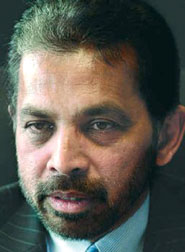 Interview with the Head of the Peace Secretariat Dr. Palitha T. B.
Kohona by V.S. Sambandan and B. Muralidhar Reddy for
the Frontline Magazine.
Interview with the Head of the Peace Secretariat Dr. Palitha T. B.
Kohona by V.S. Sambandan and B. Muralidhar Reddy for
the Frontline Magazine. 